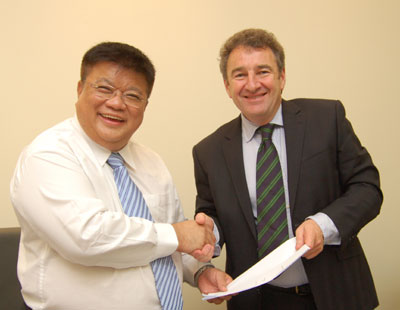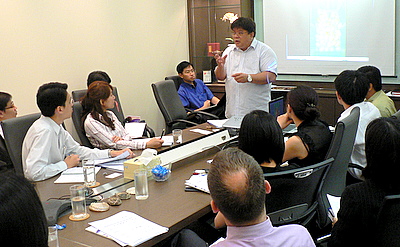 Dr Ng holding court before analysts and fund managers at Oceanus' office in Robinson Road. Photo by Leong Chan TeikDR NG CHER YEW spoke at a brisk pace for about 70 minutes, and when he finally slowed down and asked for questions, no one seemed to have any.
Dr Ng holding court before analysts and fund managers at Oceanus' office in Robinson Road. Photo by Leong Chan TeikDR NG CHER YEW spoke at a brisk pace for about 70 minutes, and when he finally slowed down and asked for questions, no one seemed to have any.Either the analysts and fund managers who packed the conference room at Oceanus’ office in Robinson Road were bored or they had their fill of the story.
It is, however, unlikely anyone can be bored listening to Dr Ng.

Dr Ng is a trained vet.
Photo by Leong Chan Teik
Photo by Leong Chan Teik
He clearly knows his business inside out.
The business has a ring of novelty to the ears of Singaporeans (and foreign analysts) but it’s also an easily understood one - the breeding and rearing of abalones, a delicacy for the Chinese.
Dr Ng, a trained Singaporean veterinarian turned venture capitalist, would have everyone know that Oceanus’ future is compelling because it has immense scale - and because he has big ambitions for it.
At a recent presentation after the Q1 results’ announcement, he began with what Oceanus had focused on doing last year: acquiring as many abalone farms as possible and as quickly as possible along the coastline of southern Fujian and northern Guangdong, so Oceanus could scale up and achieve low operating costs.
Oceanus has become the world’s largest land-based abalone farmer with about 137.9 million abalones reared in cages as at end-March this year. (Only abalones above a year old are caged)
“That has given us a dominant position as a low-cost producer in China. Even if someone has the money and wants to get as big as us, that will be fairly difficult or impossible to do. What are left are the small guys who are scattered, so if a player wanted them, it would be one here and another five km away, the next 30 km away.”
In short, any purchase of the remaining farms would not be cost-efficient to other players.
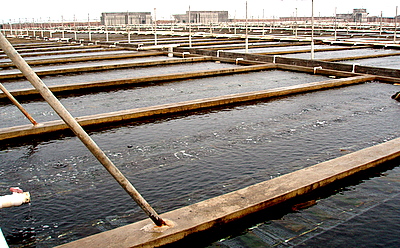
On an Oceanus farm in Fujian: Abalones are grown in cages submerged in tanks. Photo by El Lee
With its land investment largely completed, Oceanus now has switched its focus to building abalone-rearing tanks.
The current target is 40,000 tanks by the end of this year, or double the number as at end-2008, in order to house and grow 150 million abalones a year.
Aside from this steady state figure of 150 million abalones a year, Oceanus will breed and sell millions of juvenile abalones for a significant profit margin beginning from this year.
“The market for juveniles is big, almost bottomless,” said Dr Ng.
The juveniles will be sold to farmers who will rear them offshore until the creatures are about 2.5 years old, said Dr Ng.
Come March, April and May every year – the peak season that these farmers typically sell their grown abalones – Oceanus will buy back some for processing.
By selling the juveniles, Oceanus can reap profits and lower the cost of production for its entire business. “All this is making us excited, and more exciting,” said Dr Ng.
| (RMB ‘000) |
1Q09 | 1Q08 | % change |
Sale of aquaculture products
|
65,047 | 50,663 | 28.4 |
| Gain arising from changes in fair value of biological assets less estimated point-of-sale costs | 173,051 | 78,932 | 116.5 |
| Profit after tax |
107,632 | 57,934 | 85.8 |
| Earnings per share (RMB cents) |
6.11 | 4.29 | 42.4 |
After this year, Oceanus’ capex will drop off sharply with the completion of its investment in abalone tanks. The net cash position that Oceanus is counting on from 2010 onwards will enable it to start paying dividends at some point, said Dr Ng.
On another exciting new strategy, he said that Oceanus will step up its rearing of sea cucumbers. Another delicacy, sea cucumbers swim freely in the tanks where abalones are grown in cages.
Sea cucumbers feed on (don’t let this spoil your enjoyment of the dish) the faecal matter of abalones, helping to maintain the cleanliness of the water.
After six months, the sea cucumbers grow 4-5X in weight, and will be sold for a handsome profit margin.
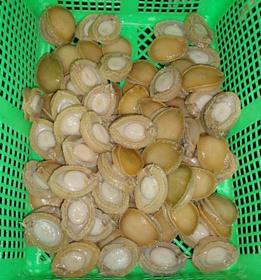
Processed abalones: Oceanus has superior processing techniques, said Dr Ng.
Processing plant ready in Q3
Oceanus, which has recently started processing abalones in leased facilities, will have its own processing plant in Q3 to process abalones and sea cucumbers, and serve as a central kitchen to prepare sauces for its restaurants.
Oceanus has already won orders for its processed abalones from customers in Hong Kong, Macau and southern China.
“We have developed certain techniques and changed the production steps in order to be able to deliver abalones in perfect shape, good texture, good taste - not fishy, and so on,” said Dr Ng.
“Ours are definitely better than those from Australia and South Africa. We think we will be able to take this market by storm when our volumes go up.”
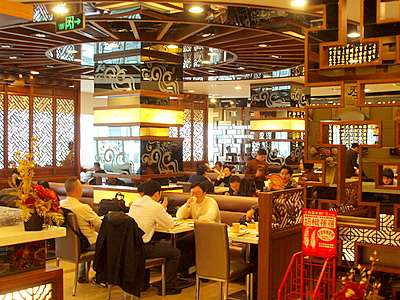
This pioneer restaurant in Shanghai will be replicated 100X in cities in China, selling abalone meals. Photo by El Lee
A joint venture (70% owned by Oceanus) with Ah Yat Abalone Group opened its first café-style restaurant above an underground MRT station in Shanghai in January this year.
Every dish comes with an abalone and a non-abalone version. With an abalone, each meal costs RMB 20 more at RMB 38-50. As it turned out, the abalone meals were what the crowd wanted, as about 77% of sales came from these meals.
The outlet sold 6,000 abalones a month in Q1. The restaurant has more than broken even, not counting start-up costs such as renovation.
Three more restaurants will open by the end of June this year. The target is to expand to 100 outlets in three years' time. From the second half of this year, the restaurants will offer takeaway meals.
If you do the math, you could arrive at sizeable profit figures that the chain could attain. A listing of the business would unlock tremendous value for Oceanus shareholders in time to come.
Giving his bullish view of the future of Oceanus, Dr Ng said: “We have the brand, the pricing and the quality to call the shots in the abalone market in China.”





